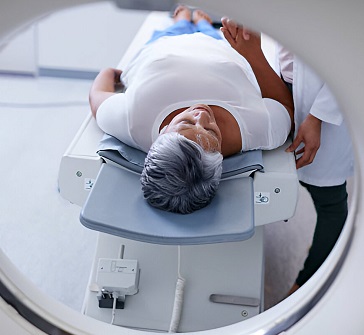 Book Appt.
Book Appt.
 Call Now
Call Now


Head and neck cancer refers to tumors that form in the mouth, nose, and sinuses, salivary glands, throat, and voice box (larynx). Squamous cell carcinomas account for the vast majority of head and neck cancers. They begin in the moist tissues of the head and neck. As the cancer progresses, the cells may spread to deeper tissues. Other cancers develop in the head and neck, including brain cancer, eye cancer, and esophageal cancer. However, they are rarely classified as head and neck cancers because the two types of cancer and their treatments are not the same.
Head and neck cancer can affect anyone, although you are more likely to develop it if:
Use tobacco or consume large amounts of alcohol. If you do both, your risk of developing head and neck cancer increases much more.
Male and over the age of 50
History of head or neck cancer
HPV (causes tonsil and base of tongue cancers)
Exposed to wood dust or other harmful materials at work (for cancers of the sinuses, nose, and upper throat)
Radiation treatment of the head and neck (for salivary gland cancer)
Infection with the Epstein-Barr virus (EBV) is associated with upper throat and salivary gland cancers
Asian (for upper throat cancer)
Types of Head and Neck Cancers
Head and neck cancers include tumors in your mouth, portions of your throat (nasopharynx, oropharynx, and hypopharynx), and other related structures.
Oral cancer
Salivary gland cancer
Nasal cavity and paranasal sinus cancer
Nasopharyngeal cancer
Oropharyngeal cancer
Hypopharyngeal cancer
Laryngeal cancer
Symptoms
The following are possible signs of head and neck cancer:
Lump in the neck
Sore in the mouth or the throat that does not heal and may be painful
Sore throat that does not go away
Trouble swallowing
Vocal change or hoarseness
Other symptoms may vary according to the type of head and neck cancer.
Causes
Head and neck cancer develops when a normal cell becomes malignant and begins to reproduce itself. The copies form a tumour, which can penetrate tissue and spread throughout the body. Cancer that has spread is known as metastatic cancer.
Risk factors
The most prevalent risk factors for head and neck cancer include tobacco use, alcohol intake, human papillomavirus (HPV), and betel nut chewing. Other risk factors include Epstein-Barr virus (EBV), a weakened immune system, heredity, long-term exposure to cancer-causing substances, radiation, salt-cured foods, and poor dental hygiene.
Diagnose
The exams and tests used to identify head and neck cancer vary depending on the type of malignancy. Examinations and tests may include:
Physical examination of the area suspected of cancer.
Blood and urine tests.
Endoscopy
Biopsy or other operation to extract cells from a region suspected of malignancy. The cells are examined under a microscope to determine if they are abnormal.
Imaging tests.
Treatments
The treatment for head and neck cancer will be determined by the type of cancer, its stage (how far advanced it is), your overall health, and other considerations. Treatment options may include surgery, radiation therapy, chemotherapy, cancer immunotherapy, and targeted therapy, which uses medications or other chemicals that primarily attack specific cancer cells while causing less harm to other cells. In some situations, you may require a mix of treatments. Sometimes surgery can impair your ability to chew, swallow, or speak. Rehabilitation options include physical therapy, dietary counselling, and speech therapy.
Prevention
You can help prevent head and neck cancer by not smoking, limiting your alcohol consumption, or not drinking at all. Getting regular dental exams and speaking with your dentist about HPV immunization.
Conclusion
Head and neck cancer pose considerable hurdles, but early detection and treatment can lead to better outcomes. Prevention through lifestyle changes, early detection through frequent screenings, and a multidisciplinary approach to treatment and care are all critical. Patients and carers should prioritize comprehensive care, which includes physical, emotional, and nutritional assistance, to manage the disease and its impact on everyday life.
SHALBY Sanar International Hospitals provides extensive medical procedures backed up with our state-of-the-art technology and a team of highly qualified & experienced clinical experts.

Grade 2 Endometrium Cancer | Ms. Robiyakhon | Uzbekistan | Dr. Archit Pandit | SHALBY Sanar

Male Breast Cancer Recovery Story | Dr. Archit Pandit | Cameroon | SHALBY Sanar

Ms. Nafisa’s Inspiring Breast Cancer Recovery | Dr. Archit Pandit | Uzbekistan | SHALBY Sanar International Hospitals

Stage4 colon cancer is curable - Colon cancer with liver metastasis | Kenya | Dr Archit Pandit

Patient from Kenya Treated by Dr. Archit Pandit | SHALBY Sanar International Hospitals

Double Cancer Victory: Mrs. Salma Kapoor's Inspiring Recovery Story | Dr. Archit Pandit

Patient from Uzbekistan Treated by Dr. Archit Pandit | SHALBY Sanar International Hospitals

Patient from Uzbekistan Treated by Dr. Archit Pandit | SHALBY Sanar International Hospitals

Successful Carcinoma Buccal Mucosa Surgery of a Patient from Nigeria by Dr. Archit Pandit

Successful Colon Cancer Surgery of Mr. Faraidun Kaka Bra Amin Amin's from Iraq | Dr Archit Pandit

Miraculous Recovery of a patient from Uzbekistan battling Ovarian Cancer | Dr. Archit Pandit

Successful Cancer Detection & Surgery by Dr. Archit Pandit | SHALBY SHALBY Sanar International Hospitals

Successful Colon Cancer Treatment of a patient from Iraq by Dr Archit Pandit | Surgical Oncology

Successful Glottis Mass & Carcinoma Vocal Cord Treatment of a patient from Iraq by Dr Archit Pandit

Successful Stage 4 Colon Cancer Treatment of a patient from Kenya by Dr Archit Pandit

Surviving the Odds: 56-Year-Old's Journey with Recurrent Carcinoma Vocal Cord | Dr. Archit Pandit

Surviving Recto-Sigmoid Cancer: Mr. Syamand Ahmed's Inspiring Journey

Success Story: Iraqi Patient's Liver Tumour Treatment at SHALBY Sanar International Hospitals

Cytoreductive Surgery Success: Iraqi Patient's 30cm Ovarian Tumor Removed Safely

Beating Liver Cancer: Mr. Abdirashid's Inspiring Story

Ms. Nejood's Success Over Pancreatic Cancer: A Remarkable Journey

Transforming Smiles: Revolutionary Buccal Commando Procedure

Wide Local Excision Surgery & Microvascular Reconstruction of a Cancer patient

Successful Surgery of Esophgeal Cancer

Successful Lung Cancer Surgery of Ms. Jerioth Wanjiru from Kenya

Para Thyroidectomy on Pt Jawad Kadhim Tweli from Iraq

Dr Archit Pandit discusses the fascinating case of Geeta Rani
Our doctors pen down their research findings and experiences from time to time. Their words provide deep insight into the latest techniques, technologies and other advancements in healthcare. It provides expert answers to all kinds of health questions for real-life issues.
VIEW ALL




Since the day of its foundation, SHALBY Sanar International Hospitals is committed to provide comprehensive healthcare services. It regularly organizes awareness programs in its premises and encourages outdoor healthcare activities and camps with an intent to put focus on preventive healthcare.
VIEW ALL